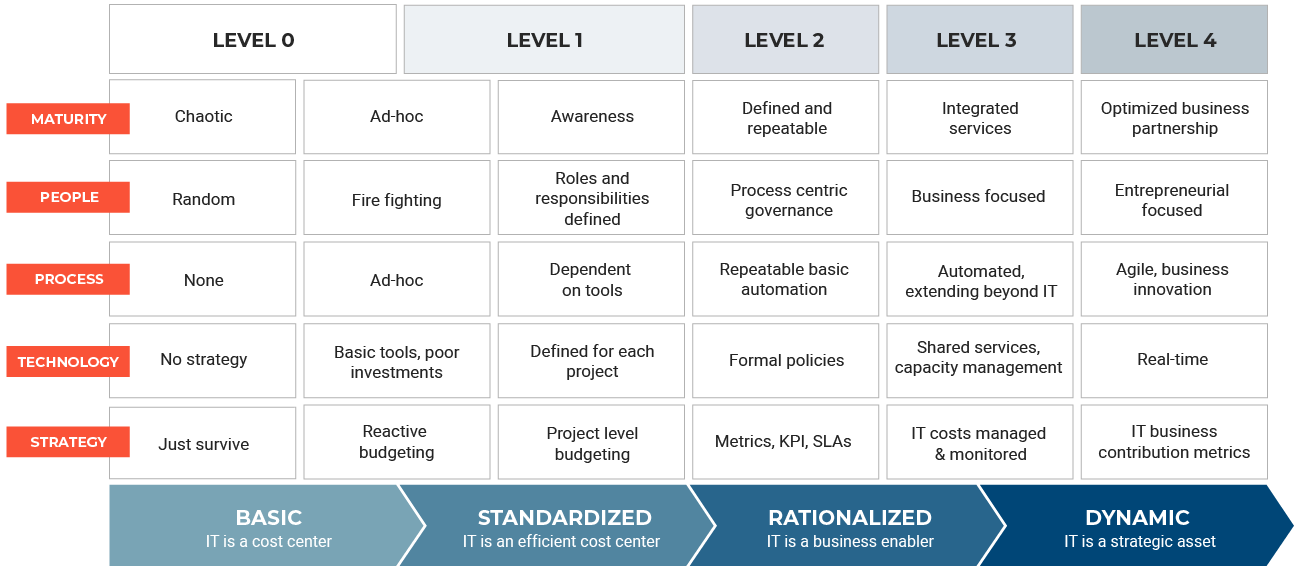

January 3, 2022 - by Bo Bray
A modern organization faces a variety of challenges on a day-to-day basis. A staggering 70% of digital transformations fail because most organizations fail to understand that digital transformation is not simply the use of technology. Instead, digital transformation is about challenging the idea of how an organization drives its business toward success using technology as an enabler for improved results. Ultimately, an organization will only view technology with the ability to provide digital transformation when the organization believes in and truly sees technology not as a cost center but an enabler.
Several organizations that come to us are trapped by systems that are highly outdated and extremely difficult to upgrade. Many of them also have a severe crunch of deeply skilled tech resources and lack of strategic IT leadership – and for these organizations, their technology organization has historically been viewed and treated as a cost center. Shifting these organizations’ technology perspective is difficult. After all, it’s hard to believe in a new direction for technology when it hasn’t helped in accomplishing business objectives in the past. The only way to have an organization undergo a mindset shift from IT being a cost center to a business driver requires thoughtful long-term planning and strategic IT leadership and governance. Both are required. It’s like any good recipe on your favorite food blog – if you leave out either ingredient, it’s going to flop.
In the recent TEITM study commissioned by Synoptek and conducted by Forrester, we studied a nonprofit organization, a Synoptek client, that could not advance its technology environment despite spending over 5% of its annual revenue on its IT-related expenses. When Synoptek engaged with them, using our Capability Maturity model, we assessed that the client was between a maturity level of 0 and 1. Please understand, this score is typical of most organizations’ maturity.
A maturity level of 0 and 1 means that the client is operating without a robust and measurable IT plan and any discernible IT strategy and vision. The client also lagged in adopting cloud technologies and was unable to deploy any other meaningful enterprise modernization.
Like many modern organizations, the client somehow managed its technology ecosystem with reactive IT budgeting and a few basic tools – painful for the business and painful for the employees. However, a lack of established processes and the inability to effectively mitigate operational and security risks (along with day-to-day operation inefficiency) led to severe business loss and employee disengagement. To put it simply, if an organization’s technology isn’t easy to use, your employees are going to be constantly frustrated which will ultimately impact talent retention.
To examine maturity scores a bit deeper, look at Synoptek’s capability maturity model:

Based on the maturity level of the client, we hand-picked 31 services for them. And yes, we considered their long-term and short-term needs while designing this packaged solution for them. These services include, but are not limited to, modernization, program management, infrastructure, cloud, data insights, and overall managed service ownership and governance.

We started our engagement by identifying and replacing critical components on the technology stack that were both slow and unreliable. Why? Because those components had a direct impact on employee productivity. Issues related to employee systems, such as the time taken for the systems to start, load, or work altogether, were addressed at the onset of our engagement. By making minor changes, Synoptek raised the maturity level of the organization’s IT organization to level 2 within the first 90 days. We then constantly evaluated and aligned our strategy and approach to achieve the defined short-term and long-term goals. Remember, the best plans must always be re-examined to ensure they are still applicable after a major milestone has been accomplished.
One of the larger endeavors we handled first was to also deploy a cloud-based analytics platform to help the client develop transparency and operational insights. By the end of one year, with our constant improvement at the people, process, and system levels, the client reached a maturity level of 3!
At Synoptek, we understand that every business has its unique challenges. That’s why we believe in providing a customized set of solutions to each of our customers. Some technology providers focus on specific aspects of a solution (such as ticket counts). We focus on the goals of the entire solution. We do this by focusing on evolving our client’s people, processes, and systems instead of only fixing their short-term challenges.
The key component to our solution is by providing a service we call strategic IT leadership. We recommend and include strategic IT leadership and governance with every Synoptek contract. We do this to reduce the client’s business risk footprint and turn technology into a predictable business function. Strategic IT leadership is the crucial component that enables customer solutions, yielding a winning formula for partnerships with all our customers.

If you are wondering what our winning formula is, it’s simple. We:
In the case of the nonprofit organization we studied for Forrester TEITM, by leveraging our Capability Maturity Model, our winning formula, and our delivery platform, we were able to enable our customer to achieve significant business outcomes. Not only was the customer able to bring stability in its internal setup, but it also observed improved employee morale and better mobilization of the workforce. Based on our work for approximately one year, the Forrester team forecasted the following economic impact on the client’s overall business:
The recent changes brought about by the pandemic have proven that technology can be an asset to an organization if adopted timely. The TEITM study gives further insights into how proven technology planning, implementation, and operations methodologies and a meaningful technology partner can evolve an organization’s IT setup from a liability to an asset in a limited period of time.